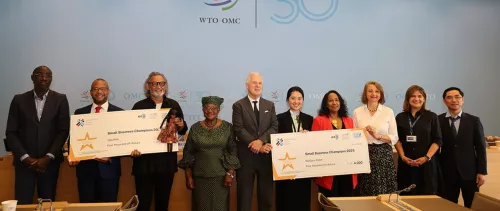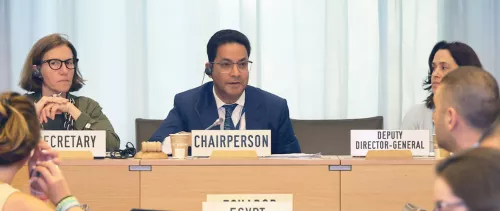
Public Forum 2022 opens with DG Okonjo-Iweala warning against “business as usual”
The WTO’s 2022 Public Forum opened on 27 September with Director-General Ngozi Okonjo-Iweala warning that the world faces multiple crises which will require new ways of thinking about trade and how the WTO works. The Director-General delivered her remarks at the opening of the Forum, the theme of which is “Towards a sustainable and inclusive recovery: ambition to action.”
The Public Forum brings together governments, the private sector, civil society, academics and consumers to consider how the trading system can help to support and sustain an inclusive economic recovery. Around 3,200 people have registered to attend this year's Forum, with 147 sessions and more than 670 speakers scheduled over the four-day event.
Speaking to CNN Anchor Richard Quest before a large audience gathered for the opening session, the Director-General noted the 2022 Public Forum is taking place at a difficult time for both global trade and the world economy as well as during a period of geopolitical instability and climate crises. Addressing these challenges will require addressing new issues and adopting new approaches, she said.
“It's not business as usual because the world is in a very difficult place at this time,” she said. “We have a situation in which we are grappling with multiple crises, which I often refer to as a polycrisis, simultaneous exogenous shocks hitting the world.”
“We have security shocks, we have climate shocks, we have energy shocks, we have food price shocks, all of this hitting countries at the same time,” the DG noted. “So we cannot afford to do business as usual. We have to be able to think out of the box and we have to accomplish things.”
The Director-General also warned that prospects for trade look dim amid growing signs of a global economic downturn.
WTO economists are currently working on a revision to the annual trade forecast issued last April, “but the indicators are not looking too good,” she said. “Global growth forecasts have been downgraded by both the World Bank and the IMF.”
Asked about the likelihood of a global recession, the Director-General said: “I think we're edging into it but at the same time, we have to start thinking of the recovery. We have to restore growth. It's too important especially for poorer members of the WTO. We have to think of what we need to do, what policies we need to pursue to restore growth.”
The Director-General said WTO members agreed on many things at the 12th Ministerial Conference in June to address current challenges, including a commitment to refrain from export restrictions on emergency food purchases by the World Food Programme, to make trade in food and agricultural inputs more predictable, to facilitate production of COVID-19 vaccines in developing countries, and to prohibit harmful fisheries subsidies contributing to the depletion of ocean fish stocks.
“All members came together, developed and developing countries,” she noted. “Everyone around the table.”
This success gives hope that the multilateral cooperation demonstrated at MC12 will continue as WTO members tackle the array of challenges remaining, she added.
“Having these successes at MC 12 augurs well,” the Director-General said. “It doesn't mean it's going to be easy, but we have quite an agenda before the WTO members. I think that helps to build the kind of confidence that may lead us to tackle the next set of problems that will help contribute to (resolving) these issues that the world is facing.”
This year's Public Forum is looking at how trade can contribute to post-pandemic economic recovery. The Forum will examine, in particular, how trade rules can be strengthened, and government policies improved to create a more resilient, sustainable and inclusive trading system.
In a subsequent plenary debate addressing the Forum theme of sustainable and inclusive recovery, a high-level panel focused on two major challenges facing policymakers: recovery from the COVID-19 pandemic and the threat of future pandemics; and climate change adaptation and mitigation.
Dr Soumya Swaminathan, Chief Scientist at the World Health Organization, cautioned that the world was “not out of the pandemic yet” but that the impact of future COVID-19 variants can be managed through equitable vaccine access.
“There are still two thirds of Africans who haven't had their primary course of vaccination,” Dr Swaminathan said. “There's still lots of vulnerable people … we have to stay prepared. But the one big difference today is we have the tools, we have the knowledge. We have the vaccines, the drugs, the diagnostics that if we use wisely and equitably, we don't have to suffer the effects of the pandemic.”
Bogolo Kenewendo, UN Climate Champions' Special Advisor and former Minister of Investment, Trade, and Industry in Botswana, said it was important to address the issues of pandemic response and climate change as a global community.
“When you are just focusing on your own little pocket, you think just by solving your problem, you will be immune to the rest of the world's problems but we know that that is not the case,” she said. “And no one is safe until we're all safe, so if you do not open up your borders, if you do not open up supply chains, then you will be as affected as everybody else.”
Mariana Mazzucato, Professor in the Economics of Innovation and Public Value at University College London, stressed the need for proper measurement metrics “that hold us accountable towards the common good” and “making sure that the community benefits.” She also highlighted the need to transform manufacturing in highly polluting sectors such as cement and steel while promoting renewable energy as part of the green transformation.
Cameron Saul, Co-Founder of BottleTop, a retailer specializing in accessories made from recycled materials, stressed the importance of meeting UN Sustainable Development Goals through individual efforts.
“Focus on the issues that matter to you as a person,” he said. “Choose the SDG that actually resonates with you and stand behind it. Think about how you can take action on that in your homes, in your immediate communities and around the world.”


